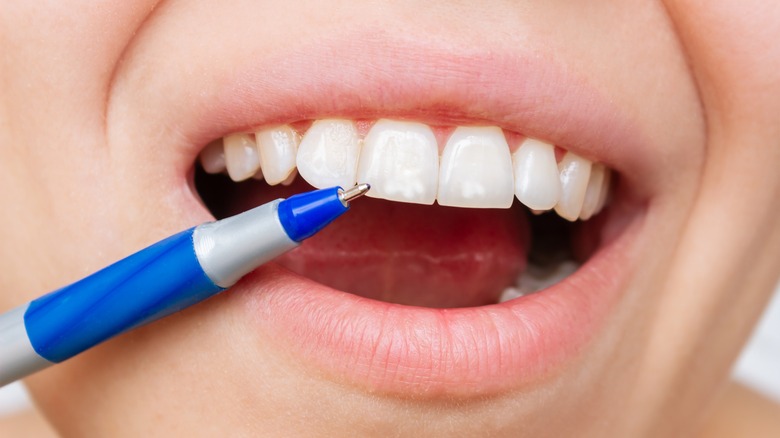How To Prevent Calcium Deposits On Your Teeth
Teeth, no matter the condition, are prone to developing calcium deposits when proper oral hygiene is not followed. Calcium deposits, also known as tartar or calculus, are essentially hardened plaque, according to LiveStrong. Plaque is a sticky film made of bacteria that's found on the outside of teeth. While plaque is normal and present in everyone's mouth, the hardened version of plaque is detrimental to the teeth, especially when the teeth are not cleaned properly.
When there's too much calcium building up on the teeth, this build-up causes calcium deposits to form, leaving behind some uncomfortable symptoms. You may not realize when you have calcium deposits forming, but if you do, you can expect a change in color or texture of the teeth, bad breath, or irritated gums, Verywell Health reports. Calcium deposits range in color, like yellow or brown. You can also run your tongue across your teeth to see if you feel any different textures, specifically a "fuzzy," textured feel.
When calcium deposits are left untreated, more serious dental problems can arise, such as gingivitis, tooth loss or infection, cavities, and issues with your gums. The bacteria in plaque can come from a number of places, like the foods and drinks you consume.
Preventing calcium deposits on teeth
It's no secret that proper oral hygiene is key to a healthy mouth, but you can't remove calcium deposits from the comfort of your own home. According to Paris Mountain Dental, calcium deposits need to be removed through a professional cleaning in a dentist's office. Special tools are needed to reach above and below your gum line in order to remove hardened plaque. However, there are steps you can take to prevent calcium deposits from appearing on your pearly whites.
Preventing calcium deposits on your teeth is quite simple: Take great care of your teeth. According to Heathline, regularly brushing, flossing, and attending your dental cleanings or check-ups ensure your teeth stay healthy. Brush twice a day and floss once a day while maintaining a healthy diet, as what you eat affects your teeth. Look for toothpaste that helps prevent plaque or replenishes calcium, too. Search specifically for products with fluoride.


